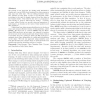Free Online Productivity Tools
i2Speak
i2Symbol
i2OCR
iTex2Img
iWeb2Print
iWeb2Shot
i2Type
iPdf2Split
iPdf2Merge
i2Bopomofo
i2Arabic
i2Style
i2Image
i2PDF
iLatex2Rtf
Sci2ools
105
click to vote
SDM
2007
SIAM
2007
SIAM
Learning from Time-Changing Data with Adaptive Windowing
We present a new approach for dealing with distribution change and concept drift when learning from data sequences that may vary with time. We use sliding windows whose size, instead of being fixed a priori, is recomputed online according to the rate of change observed from the data in the window itself. This delivers the user or programmer from having to guess a time-scale for change. Contrary to many related works, we provide rigorous guarantees of performance, as bounds on the rates of false positives and false negatives. Using ideas from data stream algorithmics, we develop a time- and memory-efficient version of this algorithm, called ADWIN2. We show how to combine ADWIN2 with the Na¨ıve Bayes (NB) predictor, in two ways: one, using it to monitor the error rate of the current model and declare when revision is necessary and, two, putting it inside the NB predictor to maintain up-to-date estimations of conditional probabilities in the data. We test our approach using synthetic ...
Related Content
| Added | 30 Oct 2010 |
| Updated | 30 Oct 2010 |
| Type | Conference |
| Year | 2007 |
| Where | SDM |
| Authors | Albert Bifet, Ricard Gavaldà |
Comments (0)

